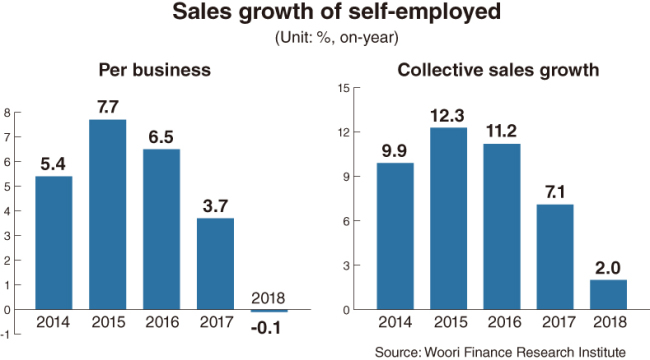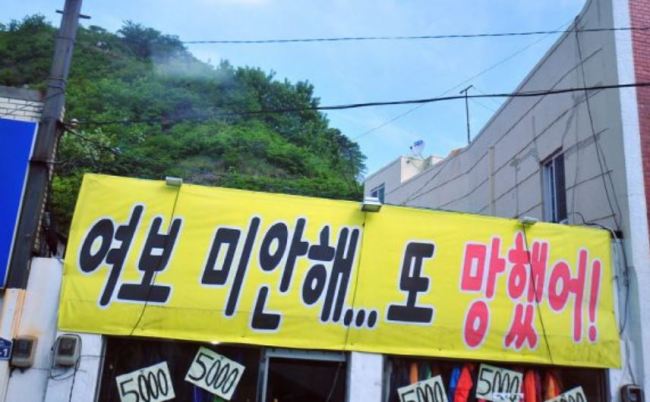[News Focus] 3 in 10 self-employed self-halt or close in 2018: report
By Kim Yon-sePublished : Dec. 17, 2018 - 12:09
SEJONG – More than 1 in 10 South Koreans, or 5.7 million among the population of 51.6 million, are engaging in self-employment. The proportion of self-employed is 20.3 percent among the 28 million economically active, which indicates people with jobs plus job seekers.
And the ratio of self-employed among total employed excluding job seekers posted 25.4 percent at the end of 2017, according to data from Statistics Korea. The percentage is quite high compared to the European Union, at 15.8 percent, Japan with 10.4 percent and the US at just 6.3 percent, which indicates a regular job shortage in Korea.
The ratio in the nation, however, is estimated to have fallen sharply this year, not because small business owners have had the chance of being hired by bigger enterprises, but because microbusinesses are now on the edge of precipice, as various data show.
As consumer prices have continued to rise over the past two years, the household sector has become conservative in spending. In addition, small businesses engaging in manufacturing, retail services and others have faced difficulty from high labor costs as the Moon Jae-in administration has pushed for drastic hikes in the minimum wage. Further, some of them are saddled with huge debt and interest burden.
And the ratio of self-employed among total employed excluding job seekers posted 25.4 percent at the end of 2017, according to data from Statistics Korea. The percentage is quite high compared to the European Union, at 15.8 percent, Japan with 10.4 percent and the US at just 6.3 percent, which indicates a regular job shortage in Korea.
The ratio in the nation, however, is estimated to have fallen sharply this year, not because small business owners have had the chance of being hired by bigger enterprises, but because microbusinesses are now on the edge of precipice, as various data show.
As consumer prices have continued to rise over the past two years, the household sector has become conservative in spending. In addition, small businesses engaging in manufacturing, retail services and others have faced difficulty from high labor costs as the Moon Jae-in administration has pushed for drastic hikes in the minimum wage. Further, some of them are saddled with huge debt and interest burden.

The Woori Finance Research Institute, in its recent report, said that average sales for self-employed in 2018 fell 0.1 percent on-year. It surveyed member stores that accept consumers’ Woori Card for payment. Their sales growth per business was 3.7 percent in 2017, 6.5 percent in 2016 and 7.7 percent in 2015. Their combined sales growth remained at 2 percent this year, compared to 7.1 percent in 2017, 11.2 percent in 2016 and 12.3 percent in 2015.
“Due to sluggish sales, 31.1 percent of our members were found to have temporarily suspended or closed down their businesses,” said the institute. “The lackluster situation could be found in the overall segments of the self-employed businesses.”
It projected that the number of their suspensions or closedowns would reach 800,000 throughout this year, adding the number had come to about 660,000 from January to September.
The Woori institute also cited the Bank of Korea’s data consumers’ payments to the self-employed by credit cards issued by Woori and others, which showed noteworthy slowdown in settlement growth on an on-year basis -- 5.5 percent in 2015, 10 percent in 2016, 4 percent in 2017 and 3.6 percent for the first nine months of 2018.
Data showed that a large portion of those working in food and beverages or lodging services chose to close or halt activities. Other segments, such as private educational institutes, cosmetics and clothing retailers, saw profitability worsen amid cutthroat competition, though the sectors recorded low closure percentages.
Government statistics showed that monthly income earned by the self-employed stood at 4.88 million won ($4,300) on average, lower by 24.6 percent compared to 6.08 million won by an average salaried household.

More seriously, the self-employed’s average debt was higher than that of salaried households, 100.87 million won to 80.62 million won. And they are reluctant to hire part-time workers amid the high statutory minimum wage, which can undermine their profitability and quality of customer service.
As market insiders share the view that their collapse will deal a critical blow to the economy, the Moon administration is mapping out measures to support microbusinesses from early 2019.
But according to officials at relevant ministries, the government is not willing to scrap its income-led growth policy, which is a basic guideline from Cheong Wa Dae.
Choi Seung-jae, a leader for the small businesses association, raised the urgent necessity to revise policy direction, saying, “There are many self-employed retailers considering going out of business due to higher personnel costs next year.”
He called for the government to take practical measures to revive the industry as quickly as possible, rather than mid- or long-term measures that require legislators’ deliberation.
By Kim Yon-se (kys@heraldcorp.com)





![[Herald Interview] 'Amid aging population, Korea to invite more young professionals from overseas'](http://res.heraldm.com/phpwas/restmb_idxmake.php?idx=644&simg=/content/image/2024/04/24/20240424050844_0.jpg&u=20240424200058)











![[KH Explains] Korean shipbuilding stocks rally: Real growth or bubble?](http://res.heraldm.com/phpwas/restmb_idxmake.php?idx=652&simg=/content/image/2024/04/25/20240425050656_0.jpg&u=)

